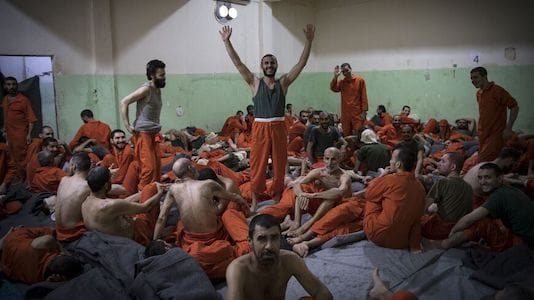 Even though, during the past year, developments in Syria have entered a stabilization trajectory, the country remains fragmented and a “playground” where different regional and national interests collide. The Assad regime has managed to maintain and extend its control in most of the Syrian territories around Damascus and in the south. However, there are still challenges from opposition forces in the northwest, the Kurdish-controlled areas in the northeast and a re-emerging ISIS threat looming both from previously ISIS-controlled enclaves as well as prisons and camps.[1] At the same time, lines are blurred in regional alliances, such as the one between Russia and Iran, as the players attempt to consolidate their power at each other’s expense. What will 2022 look like for Syria and what are the imminent threats for the country’s sovereignty?
Even though, during the past year, developments in Syria have entered a stabilization trajectory, the country remains fragmented and a “playground” where different regional and national interests collide. The Assad regime has managed to maintain and extend its control in most of the Syrian territories around Damascus and in the south. However, there are still challenges from opposition forces in the northwest, the Kurdish-controlled areas in the northeast and a re-emerging ISIS threat looming both from previously ISIS-controlled enclaves as well as prisons and camps.[1] At the same time, lines are blurred in regional alliances, such as the one between Russia and Iran, as the players attempt to consolidate their power at each other’s expense. What will 2022 look like for Syria and what are the imminent threats for the country’s sovereignty?
 Syria’s north-western region of Idlib remains the stronghold of the opposition forces, with the most prominent jihadist groups operating there, as well as the most committed opposition forces against Assad’s regime. As Aron Lund states, the rebel-held areas are governed by a patchwork of sharia courts, local councils, exile government departments, and direct rule by armed groups. However, instead of forming a unified opposition, those non-state actors are competing against each other for control over Idlib.
Syria’s north-western region of Idlib remains the stronghold of the opposition forces, with the most prominent jihadist groups operating there, as well as the most committed opposition forces against Assad’s regime. As Aron Lund states, the rebel-held areas are governed by a patchwork of sharia courts, local councils, exile government departments, and direct rule by armed groups. However, instead of forming a unified opposition, those non-state actors are competing against each other for control over Idlib.
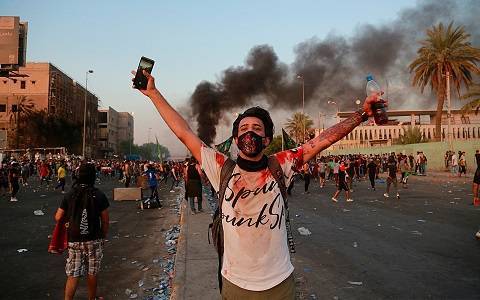 This analysis aims at underlining the economic and political crisis in Iraq that led to widespread protests around the country since October 2019. The government’s inability to deliver basic services to society has created a series of protests with demands for better living conditions. The Iraqi security forces and armed militias are using extreme force to tackle the demonstrations with many protesters injured or killed. Hence, the question that presents itself is how foreign interventionism affects the country’s society and sense of security, as well as its economy.
This analysis aims at underlining the economic and political crisis in Iraq that led to widespread protests around the country since October 2019. The government’s inability to deliver basic services to society has created a series of protests with demands for better living conditions. The Iraqi security forces and armed militias are using extreme force to tackle the demonstrations with many protesters injured or killed. Hence, the question that presents itself is how foreign interventionism affects the country’s society and sense of security, as well as its economy.
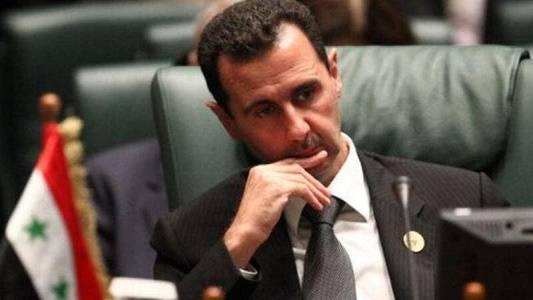 Despite the latest ceasefire in Idlib, tensions are once again rising across Syria. In the northwest, the high mobility in Idlib indicates that renewed fighting is rather a matter of timing, while in the south and east, escalating assassination campaigns in Daraa and Deir ez-Zor generate new dangerous dynamics. In central and eastern Syria, the resurgence of ISIS cells further exposes a severe security vacuum that opens way for intensive influence competition between the Kurds and the regime. Last but not least, the unprecedented economic crisis that face the country threatens to derail even the minimum stability enjoyed in Syria at the moment.
Despite the latest ceasefire in Idlib, tensions are once again rising across Syria. In the northwest, the high mobility in Idlib indicates that renewed fighting is rather a matter of timing, while in the south and east, escalating assassination campaigns in Daraa and Deir ez-Zor generate new dangerous dynamics. In central and eastern Syria, the resurgence of ISIS cells further exposes a severe security vacuum that opens way for intensive influence competition between the Kurds and the regime. Last but not least, the unprecedented economic crisis that face the country threatens to derail even the minimum stability enjoyed in Syria at the moment.
 As the Syrian civil war nears its end, the regime’s imminent victory against the remaining opposition forces in Idlib tends to be overshadowed by several emerging issues that threaten to trigger a new circle of instability. In the meantime, irrespective of any outcome in the north, another ‘war’ still rages and will continue to rage in the country. The one between Iran, which struggles to recover from the assassination of General Qasem Soleimani, and Israel, which meticulously tries to fend off the former’s entrenchment in the country.
As the Syrian civil war nears its end, the regime’s imminent victory against the remaining opposition forces in Idlib tends to be overshadowed by several emerging issues that threaten to trigger a new circle of instability. In the meantime, irrespective of any outcome in the north, another ‘war’ still rages and will continue to rage in the country. The one between Iran, which struggles to recover from the assassination of General Qasem Soleimani, and Israel, which meticulously tries to fend off the former’s entrenchment in the country.
 The recent assassination of general Soleimani, has to be viewed as the latest phase within the framework of the ongoing game that goes back to 2001, or 1979, or 1953 depending on your historical perspective.
The recent assassination of general Soleimani, has to be viewed as the latest phase within the framework of the ongoing game that goes back to 2001, or 1979, or 1953 depending on your historical perspective.
As the war in Syria is coming to an end, it appears that the US have been attempting to rebalance the region and create a new equilibrium. The Trump Doctrine is being forged by a series of unorthodox unilateral actions, from the recognition of Jerusalem as the capital of Israel to unquestioned support of Saudi Arabia, regardless of the latter's actions. In addition, President Trump has supported the formation of an energy axis among Israel, Cyprus and Greece, effectively blocking Turkey in the Eastern Mediterranean and has chastised Turkey's decisions and association with Russia, while he has allowed Turkey to invade, occupy and set a zone within Syria. Last but not least, the US administration has been trying to put Iran “back in the box”, as Iran has benefited from US interference in the region since 2001, especially following the war against the Islamic state.
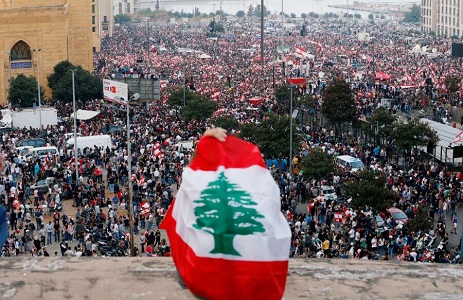 The economic recession, the dysfunctional political system and the refugee crisis have made Lebanon a vulnerable player in the Middle East region. The economic reforms that the former Prime Minister of Lebanon, Saad Hariri, tried to introduce, caused a massive cross-sectarian wave of demonstrations which lead Lebanon to political instability and to the Prime Minister’s resignation. Moreover, Hezbollah’s reaction and the developments in Syria make the situation in Lebanon even more complicated. Rapid developments in Lebanon are leading to a significant alteration in Lebanon’s political system which are affecting the citizens’ lives.
The economic recession, the dysfunctional political system and the refugee crisis have made Lebanon a vulnerable player in the Middle East region. The economic reforms that the former Prime Minister of Lebanon, Saad Hariri, tried to introduce, caused a massive cross-sectarian wave of demonstrations which lead Lebanon to political instability and to the Prime Minister’s resignation. Moreover, Hezbollah’s reaction and the developments in Syria make the situation in Lebanon even more complicated. Rapid developments in Lebanon are leading to a significant alteration in Lebanon’s political system which are affecting the citizens’ lives.
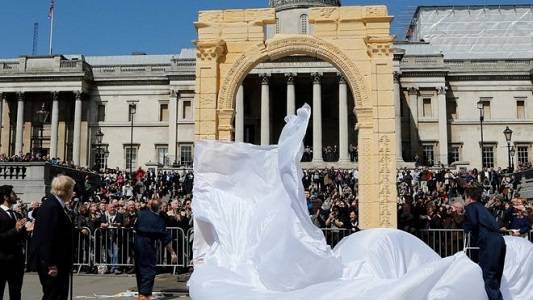 Since the beginning of the war in Syria in 2011, the country’s cultural heritage has been subjected to different kinds of annihilation. With the conflict nearing some kind of end but external forces still destabilizing the region, ongoing plans for the reconstruction of Syria’s archaeological casualties generate a multifaceted debate over when they should be taking place, the motivating factors behind these projects, their purpose and who are the stakeholders coordinating their implementation. Τhe reconstruction of post-conflict archaeology in Syria could be providing a valuable opportunity for sustaining communities through participatory initiatives that appropriate the traces of war.
Since the beginning of the war in Syria in 2011, the country’s cultural heritage has been subjected to different kinds of annihilation. With the conflict nearing some kind of end but external forces still destabilizing the region, ongoing plans for the reconstruction of Syria’s archaeological casualties generate a multifaceted debate over when they should be taking place, the motivating factors behind these projects, their purpose and who are the stakeholders coordinating their implementation. Τhe reconstruction of post-conflict archaeology in Syria could be providing a valuable opportunity for sustaining communities through participatory initiatives that appropriate the traces of war.
 The ongoing process of the “safe zone” establishment in Northeastern Syria and the management of the Idlib province further complicate and strain relations between allies, jeopardizing an already fragile and volatile state of affairs. The reconciliation of the incompatible aims of all parties involved therein is an uphill task. Both the US and Russia struggle to balance the colliding interests of their allies on the ground, whilst maintaining good ties with Turkey appears pivotal for them. For its part, Turkey, pressed by its domestic problems, is using the refugees and the jihadist threat as bargaining chips in negotiations.
The ongoing process of the “safe zone” establishment in Northeastern Syria and the management of the Idlib province further complicate and strain relations between allies, jeopardizing an already fragile and volatile state of affairs. The reconciliation of the incompatible aims of all parties involved therein is an uphill task. Both the US and Russia struggle to balance the colliding interests of their allies on the ground, whilst maintaining good ties with Turkey appears pivotal for them. For its part, Turkey, pressed by its domestic problems, is using the refugees and the jihadist threat as bargaining chips in negotiations.
Το Κέντρο Μεσογειακών,Μεσανατολικών και Ισλαμικών Σπουδών φιλοξενεί πληθώρα διαφορετικών απόψεων στα πλαίσια του ελεύθερου ακαδημαϊκού διαλόγου. Οι απόψεις αυτές δεν αντανακλούν υποχρεωτικά τις απόψεις του Κέντρου. Η χρήση και αναπαραγωγή οπτικοακουστικού υλικού για τις ανάγκες της ιστοσελίδας του ΚΕΜΜΙΣ γίνεται για ενημερωτικούς, ακαδημαϊκούς και μη κερδοσκοπικούς σκοπούς κατά τα προβλεπόμενα του Νόμου 2121/1993 (ΦΕΚ Α' 25/4-3-1993) περί της προστασίας της πνευματικής ιδιοκτησίας, καθώς και του άρ.8 του Νόμου 2557/1997 (ΦΕΚ Α' 271/1997).

